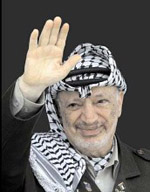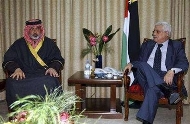
Despite the increasingly evident sense of fatigue and frustration within Palestinian society, particularly in recent months, tens of thousands of people across the West Bank and the Gaza Strip took to the streets today to mark the 2nd anniversary of Yasser Arafat’s passing. Perhaps, it is only through this particular occasion, and the memory it seeks to evoke, that the Palestinians are able to transcend their differences and tragedies, albeit for a few hours, and somewhat contemplate better days.
For many Palestinians, the name “Yasser Arafat” has come to embody more than a leader, a president, and a revolutionary. Abu ‘Ammar epitomised Palestine itself, the people, the land, and –most importantly– the cause. Today, as we commemorate his legacy, a sombre mood haunts the occupied Palestinian territories, but what distinguished Abu ‘Ammar; what made him, above everyone else, Mr. Palestine?
From the onset of FATEH’s control of the PLO in 1969, hence Arafat’s emergence as the Palestinian people’s national leader, until his death/murder in November 2004, Abu ‘Ammar’s vision was never clouded before the crucial necessity of preserving the Palestinian narrative and sustaining it on the regional and global political landscape, at any expense. Whether through the armed struggle adopted by the PLO in the 60s, 70s, and part of the 80s, or through political dialogue and diplomacy towards the end of the 80s, 90s, and into the 21st Century, Abu ‘Ammar succeeded on two major fronts: he was able to distinguish the Palestinian struggle for liberation and independence as a predominantly national cause, rather than a broadly Arab or Islamic aspiration, and he assertively underlined the ‘Palestinian factor’ of the Arab-Israeli conflict as the single most crucial prerequisite for its resolution.
His unmatched personal charisma and tactful approach towards both Palestinian and external political forces significantly contributed to his own survival as a key player in a political equation of vast regional and global dimensions. To his Palestinian opponents, he possessed a rare quality by which the most Machiavellian theories of political realism are challenged and defeated; he was both feared and loved at the same time.
Equally decisive was his ability, as Chairman of the PLO, and later as President of the Palestinian National Authority, to unify the various Palestinian political forces; the dwindling Palestinian left, the anachronistic pan-Arab movements, the elitist intellectuals and entrepreneurs of Palestinian society, the nationalists, and even the emerging, and later dominant, radical Islamist movements. They all willingly accepted the leadership of Yasser Arafat, and incorporated his larger-than-life presence as a central governing dynamic of their own political and social agendas.
However, this phenomenon was not merely based on the reactive behaviour of Abu ‘Ammar’s surroundings; he realised the value of Palestinian society’s diverse socio-political structure to his own standing, and knew exactly how to mobilise and empower it.
For Yasser Arafat, everybody deserved an audience. He facilitated the development of a pluralistic society; he safeguarded the rights of Palestine’s marginalised groups and minorities (women, Palestinian-Christians, among others), he entertained his opposition with a unique spirit of acceptance and persistence, and he developed and sustained a strong sense of communitarianism among all Palestinians; a sense of belonging in which the interest of the Palestinian cause remained sacred.
As the dimming lights of Al-Muqata’a (Arafat’s Presidential headquarters in Ramallah) haunt Palestinians with a reminder of a lost era, it is sincerely hoped that the Haniyyehs, Mesh’als, and Abbas’ of today will find the wisdom and courage to honour the legacy of Abu ‘Ammar.
Rami Bathish is director of the Media and Information Programme at the Palestinian Initiative for the Promotion of Global Dialogue and Democracy (MIFTAH). He can be contacted at mip@miftah.org










